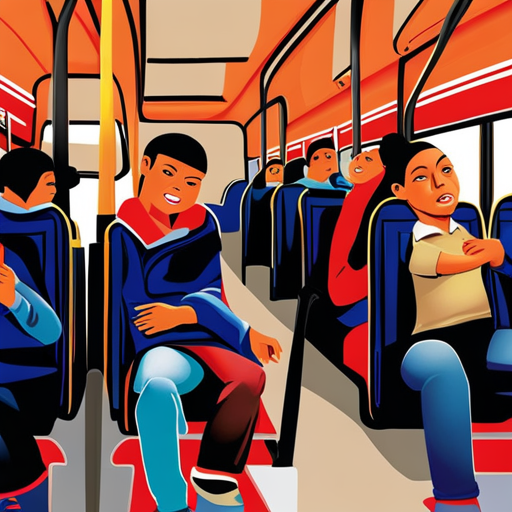"Cherishing Little Steps - A Haven for Baby and Family Journeys"
Preparing Kids for Bus Rides
Are you a caregiver or a parent getting ready to send your child off on their first bus ride to school? Preparing kids for bus rides is an essential task that requires careful planning and consideration.
By establishing a routine, teaching bus safety rules, and packing a bag with essentials, you can help ensure a smooth and safe journey for your little one.
It’s also important to help them practice waiting, teach good bus etiquette, and discuss emergency procedures. Addressing bullying and peer interactions is crucial, as is encouraging independence and responsibility.
Remember to follow up and stay informed about their bus experiences. With your guidance and support, your child will be well-prepared for their exciting bus adventures.
Establish a Routine
To ensure a smooth bus ride experience, you should consistently establish a daily routine for your child. By establishing consistency, you’re setting clear expectations for your child and helping them feel prepared and confident for their bus rides.
Start by creating a morning routine that includes waking up at the same time each day, getting dressed, and having a nutritious breakfast. This will help your child feel energized and ready to start their day.
Next, establish a routine for getting to the bus stop. Make sure your child knows the exact time they should be at the bus stop and how long it takes to get there. This will prevent any last-minute rushes and ensure that your child arrives at the bus stop on time.
Additionally, it’s important to establish a routine for behavior on the bus. Teach your child to be respectful to the bus driver and other passengers. Emphasize the importance of staying seated and keeping their belongings organized. By setting these expectations, you’re helping your child understand the importance of following rules and being considerate of others.
Teach Bus Safety Rules

Learn and practice bus safety rules to ensure a safe and enjoyable ride for you and your child. Teaching your child about bus safety is essential in keeping them protected while traveling to and from school.
Here are three important rules to follow:
-
Teach Stranger Danger: It’s crucial to explain to your child the importance of never talking to strangers at the bus stop or on the bus. Remind them to only speak with the bus driver or trusted adults they know, like a teacher or parent.
-
Practice Emergency Exits: Show your child where the emergency exits are on the bus and teach them how to use them in case of an emergency. Practice exiting the bus through the rear door or emergency windows, emphasizing the importance of staying calm and following the driver’s instructions.
-
Follow Bus Rules: Teach your child to follow the bus rules set by the driver. This includes staying seated at all times, keeping their belongings out of the aisle, and refraining from distracting the driver. Encourage them to be respectful and considerate of other passengers on the bus.
Pack a Bag With Essentials
Pack a backpack with essential items for your child’s bus ride. It’s important to make sure your child has everything they need to stay comfortable and entertained during their journey.
First, let’s talk about snack options. Pack a variety of healthy snacks that your child enjoys. Some great choices include granola bars, fruit slices, and trail mix. Make sure to avoid snacks that are messy or require refrigeration.
Next, let’s consider entertainment choices. Help your child pick out a few items that will keep them occupied during the ride. This could include a favorite book, a small puzzle or game, or even a handheld electronic device with headphones.
Don’t forget to pack a water bottle to keep your child hydrated throughout the journey.
Lastly, it’s a good idea to include a small comfort item, such as a stuffed animal or blanket, to help your child feel safe and secure on the bus.
Help Them Practice Waiting

After packing a bag with essentials for your child’s bus ride, it’s important to help them practice waiting. Waiting can be hard sometimes, but it’s a skill that can be learned. Here are three ways you can help your child practice patience and develop self-control:
-
Play waiting games: Turn waiting into a fun activity by playing games. For example, you can play ‘I Spy’ or ’20 Questions’ while waiting at the bus stop. This won’t only make the time go by faster but also teach your child how to be patient and control their impulses.
-
Set timers: Use a timer to help your child understand how long they need to wait. Start with short intervals and gradually increase the time. Encourage them to engage in activities like reading a book or drawing while waiting for the timer to go off. This will teach them the importance of using their time wisely and being patient.
-
Practice deep breathing: Teach your child deep breathing exercises to help them stay calm and patient while waiting. Inhaling deeply through the nose and exhaling slowly through the mouth can help them relax and stay focused. Encourage them to use this technique whenever they feel impatient or restless.
Teach Good Bus Etiquette

Practice good bus etiquette by teaching your child how to be considerate and respectful towards others while riding the bus. It’s important to teach your child proper manners and explain the boundaries that they should follow while on the bus.
Start by teaching your child the importance of saying ‘please’ and ‘thank you’ when interacting with the bus driver and other passengers. Encourage them to hold the door open for others and offer their seat to someone who may need it more, such as an elderly person or a pregnant woman. Remind them to keep their voices down and avoid shouting or being disruptive during the ride.
Explain to your child that they should respect other people’s personal space by keeping their belongings close to them and not taking up more than one seat. Encourage them to keep their feet off the seats and not to lean on or touch other passengers without their permission.
Teaching your child good bus etiquette won’t only make their bus rides more enjoyable, but it will also help them develop empathy and consideration for others. By instilling these values early on, you’re preparing them to be responsible and respectful members of society.
Communicate With the Bus Driver
To ensure a safe and smooth bus ride, it’s important for you to communicate effectively with the bus driver. Building rapport with the bus driver not only creates a friendly atmosphere but also helps in establishing a sense of trust and respect.
Here are three ways you can effectively communicate with your bus driver:
-
Greet the driver with a smile: When you get on the bus, make sure to greet the driver with a friendly smile and a polite ‘hello.’ This simple act of kindness can go a long way in establishing a positive relationship.
-
Use clear and respectful language: When talking to the bus driver, speak clearly and respectfully. Use your manners and always say ‘please’ and ‘thank you.’ Remember, the bus driver is there to help you, so treat them with kindness and respect.
-
Report any concerns or issues: If you notice something unusual or have any concerns during the bus ride, don’t hesitate to inform the bus driver. They’re there to ensure your safety, and by communicating any issues, you’re helping them do their job effectively.
Discuss Emergency Procedures

During the bus ride, it’s crucial to make sure your child understands the emergency procedures. While we hope that emergencies never happen, it’s essential to be prepared just in case. One way to prepare is by practicing emergency drills at home. Create scenarios and have your child practice what they should do in case of an emergency on the bus. This could include things like knowing how to exit the bus safely, where to go, and who to talk to for help.
Another important aspect of emergency preparedness is having a communication plan. Discuss with your child who they should contact if there’s an emergency. Identify trusted adults, such as teachers or family members, who can be reached in case of an emergency. Teach your child important phone numbers, like those of trusted adults and emergency services. Make sure they understand the importance of staying calm and speaking clearly when making emergency phone calls.
Address Bullying and Peer Interactions
Discuss how to address bullying and peer interactions on the bus with your child. It’s important for kids to feel safe and comfortable during their bus rides, and addressing these issues can help create a positive environment for everyone.
Here are three ways you can address bullying and peer interactions on the bus:
-
Conflict resolution: Teach your child effective ways to handle conflicts and disagreements. Encourage them to communicate calmly and assertively, and to seek help from the bus driver or an adult if needed. Remind them to treat others with kindness and respect, even if they disagree.
-
Building self-confidence: Help your child develop a strong sense of self-worth and confidence. Encourage them to stand up for themselves and others, without resorting to aggression. Teach them to believe in their own abilities and to surround themselves with positive friends who uplift them.
-
Open communication: Create a space for your child to share their experiences and concerns. Encourage them to talk openly about any issues they may be facing on the bus, and assure them that you’re there to support and listen to them. Remind them that it’s important to report any incidents of bullying or inappropriate behavior to a trusted adult.
Encourage Independence and Responsibility
Encourage your child to take ownership and be responsible for their actions while riding the bus. Building confidence and fostering self-reliance are important for their overall development. Teach them the importance of following the bus rules and behaving responsibly. Remind them to be respectful to the bus driver, their fellow passengers, and the bus itself. Encourage them to take care of their belongings and keep the bus clean.
To build confidence, help your child practice using public transportation. Take them on short trips and teach them how to navigate different routes. Show them how to read bus schedules and plan their journey. Encourage them to ask for help if they need it, but also empower them to figure things out on their own. This will give them a sense of independence and self-reliance.
Teach your child about safety measures while riding the bus. Remind them to always wait for the bus at designated stops, never run after a moving bus, and use handrails while boarding and exiting. Help them understand the importance of staying seated and wearing seatbelts if available.
Follow Up and Stay Informed
Are you aware of the importance of staying informed and following up when it comes to your child’s bus rides? It’s crucial to stay connected and establish trust with the school and the bus driver.
Here are three ways you can do that:
-
Communicate with the school: Make sure you have the most up-to-date contact information for the school and the bus driver. If there are any changes in your child’s schedule or if you have any concerns, reach out to the school and let them know. They’ll appreciate your proactive approach and it will help them ensure your child’s safety.
-
Talk to your child: Have regular conversations with your child about their bus rides. Ask them how their day was, if they encountered any issues or if they’ve any worries. By keeping an open line of communication, you’ll be able to address any concerns they may have and provide reassurance.
-
Attend parent meetings: Whenever there are parent meetings or events related to bus safety, make sure you attend. This shows your commitment to your child’s well-being and allows you to stay informed about any changes or updates regarding bus procedures.
Frequently Asked Questions
How Can I Help My Child Overcome Separation Anxiety When Waiting for the Bus?
You can help your child overcome separation anxiety by helping them manage it in other situations. Building trust and confidence in them for bus rides is important, so reassure them and show them it’s safe.
What Should I Do if My Child Forgets Something on the Bus?
If your child forgets something on the bus, don’t worry! Encourage them to tell the bus driver right away. They can ask their teacher or a parent to help them get their item back.
Is It Safe for My Child to Eat or Drink on the Bus?
Yes, it is safe for your child to eat or drink on the bus. However, it’s important to follow bus ride etiquette and the rules for eating and drinking. Make sure to clean up after yourself and avoid messy or noisy foods.
How Can I Teach My Child to Handle Conflicts With Other Children on the Bus?
Teaching conflict resolution and building social skills are important for your child’s bus ride. Help them understand the importance of listening, sharing, and being kind to others. Encourage open communication and problem-solving to handle conflicts peacefully.
What Should I Do if My Child Gets Lost or Gets off at the Wrong Bus Stop?
If your child gets lost or gets off at the wrong bus stop, stay calm and follow these steps: contact their emergency contact, teach them bus safety, and ensure they know what to do in an emergency.
Conclusion
You’ve done it! You’ve taken the necessary steps to prepare your child for bus rides.
By establishing routines, teaching safety rules, and discussing emergency procedures, you’ve empowered them to navigate the bus with confidence.
Remember, accidents can happen, but with your guidance and their newfound knowledge, they’ll be well-equipped to handle any situation.
So sit back and watch as your child embarks on their bus adventures, knowing that you’ve prepared them for success.


